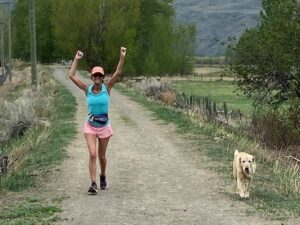Raising Awareness in June
 |
Jen’s Conquer the Lake Scleroderma RunTo support Jen CLICK HERE |
SCLERODERMA, the life threatening and rare disease I was diagnosed with seven years ago made its way into my lungs and literally took my breath away. It quickly took over my body and drug therapy options were running out. Invasive stem cell transplant became a treatment option.
Prior to my diagnosis, I was a competitive marathon runner. I relied on my lungs, body and inner strength to get me across the finish lines. I was fit and unstoppable! When my doctors told me I would never run again I was devastated. Not only was running a huge part of my physical life, but it was also my emotional therapy. Three years ago, in collaboration with my doctors I was blessed to find a drug therapy that has helped to slow down the progression, stabilize my lungs and significantly improve the quality of my life.
Along with the approvals of my doctors I decided it was time to lace up my running shoes, embrace my limitations and focus on what I can do. I have set a goal to run a half marathon in June 2023. Aside from my personal reasons for embarking on this journey, I want to create awareness, possibility and inspire hope for others living with this presently incurable disease.
Truth be told, there’s no owner’s manual on how to train in this new scleroderma body. I have had to take direction from my multifaceted health care team and learn how to adapt and accommodate the damage scleroderma has done to my body. With my decreased lung capacity, I am not able to transport oxygen to my muscles efficiently and therefore I have had to run the same distances I used to but much slower. As a result, my body is absorbing more impact through all my joints, bones and muscles. My skin tightness has changed the biomechanics of how I run so I have had some unexpected injuries that have sidelined some of my training. With recommendations from my multidisciplinary team, I may have to shorten my running distance for June’s run. I continue to fiercely persevere forward and feel grateful to have this opportunity.
This running journey has empowered me to let go of my “old body” and give myself permission to be the best version of my differently abled self. Despite all the challenges scleroderma presents physically and emotionally I pride myself on my ability to stay positive, hopeful and courageously resilient moving forward. I can hardly wait to cross the finish line in June!!! It will be an epic day! These are the moments we live for.
“A mile is still a mile no matter how long it takes!”
Please contact us if you would like to conduct interviews with a doctor, a scleroderma patient or a Scleroderma Association of B.C. representative.
Phone: 604-371-1005
E-Mail: info@sclerodermabc.ca





